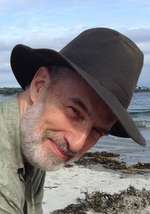Reflections on Drinking from the Source of Love(Part Two) Jul 26, 2009  In Part One of this column, “Drinking from the Source of Love” (which I recommend reading first), I wrote about my personal experience on a beautiful spring morning in Virginia when I walked across our yard and stopped, and stared at a truly lovely sight. There were three blue and purple and yellow irises waving at me, as if to say, “We’re here. Have you noticed us yet?” In truth, I had not. I had seen them, but I had not regarded them. They were magnificent, and as I gazed at them, they became the center of my world. Their dignity and richness of color expressed something that one can’t write about, but can only experience. Sophie Scholl, killed by the Nazis for her involvement with the nonviolent student group, the White Rose, expressed it well when she wrote, “Who would have thought it possible that a tiny little flower could preoccupy a person so completely that there simply wasn't room for any other thought...” Iris Murdoch, the English author, stated, “People from a planet without flowers would think we must be mad with joy the whole time to have such things about us.” Why do flowers have this effect on human beings? Why is it that we can also completely lose touch with the beauty of nature, caught up as we sometimes are with the pain and grind of daily life? The human experience is often ugly and vapid. We are distracted by innumerable things, and frequently spend our time surrounded by metal and glass and plastic, breathing in noxious fumes, battered by discordant sounds. We can become dulled by technology, unaware of the beauty of creation. Ralph Waldo Emerson wrote, “To the dull mind nature is leaden. To the illumined mind the whole world burns and sparkles with light.” Our dullness even affects the natural world around us, not only because we pollute it, but because we don’t notice it. Soot covered trees at a highway exit are lonely creatures, unloved and in pain. Nature is often unloved because we, the ones for whom nature was created, have not yet become fully resonant with the invisible messages transmitted through the natural world. Thoreau wrote that, “If a man walks in the woods for love of them half of each day, he is in danger of being regarded as a loafer. But if he spends his days as a speculator, shearing off those woods and making the earth bald before her time, he is deemed an industrious and enterprising citizen.” We are not entirely at peace. The world is not at peace. Yet, we are surrounded by peace emanating from the songs of birds, the glory of wild flowers and the calm grandeur of trees. How many of us have felt a deep spirit of joy while viewing the colors laid across the sky by the sun rising or setting? Many of us can agree with Joseph Campbell’s statement that “God is the experience of looking at a tree and saying, ‘Ah!’” We resonate with nature because nature expresses those two things that we hold most dear: love and beauty. We have labeled ourselves as Homo Sapiens, but I believe that it would be more accurate to reclassify humankind as “Homo Agape”, with words coming from both Latin and Greek. We are not just men and women of rational thought. We are men and women of love. We don’t often fulfill the standard of agape love, but our hearts have sensed it. It is very clear that human beings possess “heartistic” radar that allows them to sense a vast and invisible world of thought and feeling and love. We are not machines, and we are not animals, simply fighting to survive. Whether we believe in one God as the source of love, or many Gods, or none at all, we all experience the impact of love in our lives. We feel most peaceful when we are surrounded by love and by a world of beauty. Unlike nature, however, we are not automatically plugged into the source of love. The roots of trees drink deeply from the waters of the earth, but we have roots that can dangle unconnected and forgotten until they dry up and wither almost completely away. Our tragedy, as Homo Agape, is that we are surrounded by cups of nectar every day, but we don’t pick them up and drink. Love is everywhere in nature, surrounding us at every moment. Even in the grimmest of city lives, we can find a patch of sky, a breath of wind or a bird to console our hearts. Minnie Aumonier wrote that “There is always Music amongst the trees in the Garden, but our hearts must be very quiet to hear it.” Internal silence and awareness will allow us to reconnect our roots, and drink deeply from the source of love that is expressed to us through nature, through music and through people. By doing so, we will find peace, we will become peace and we will carry our peace with us wherever we go. Peter Falkenberg Brown is passionate about writing, publishing, public speaking and film. He hopes that someday he can live up to one of his favorite mottos: “Expressing God’s kind and compassionate love in all directions, every second of every day, creates an infinitely expanding sphere of heart.”
(Comments are moderated and must be approved.) “The Epiphany of Zebediah Clump”
Watch our first film right here. |










